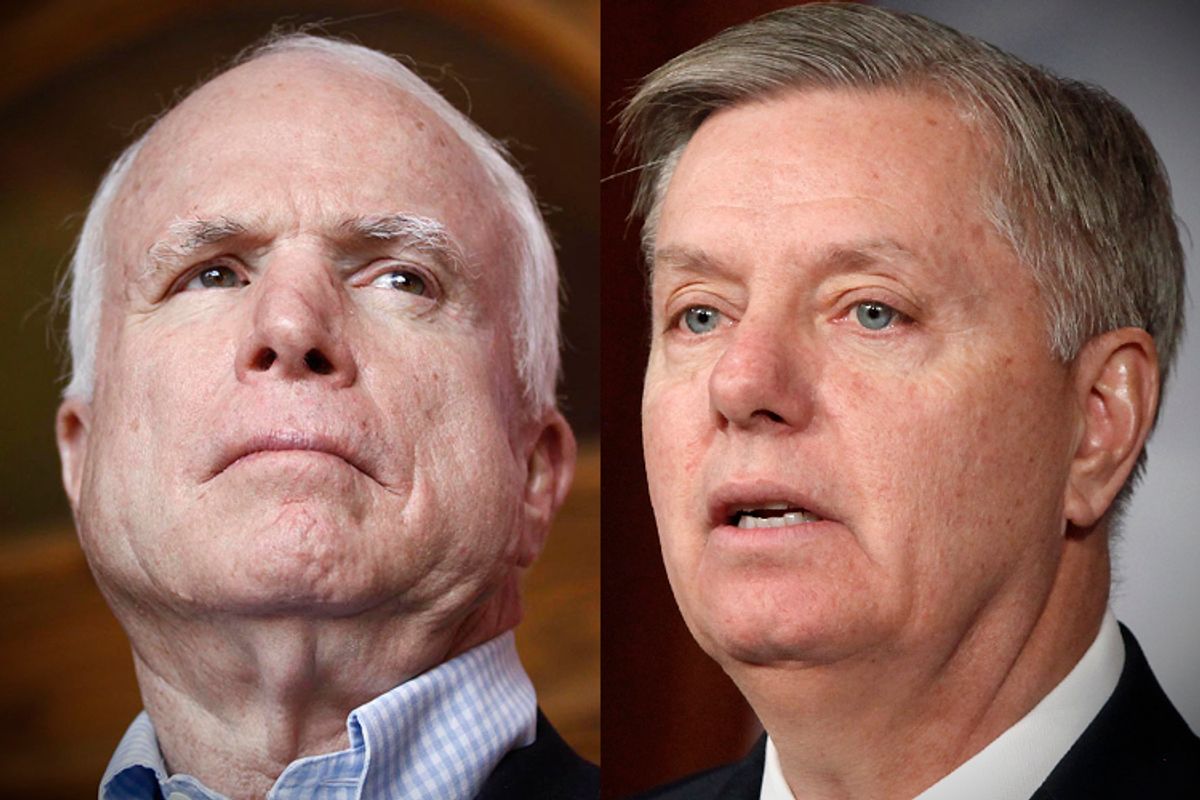The Senate GOP's Bomb Everything All the Time Caucus, Sens. John McCain and Lindsey Graham, issued a joint statement late last week calling for Iraq to be bombed, all the time. The two most predictable players in American foreign policy wrote that "our most immediate priority must be to reverse the advance of a terrorist force that is more radical, violent, and ambitious than Al-Qaeda. We see no way to achieve this goal without U.S. air strikes, among other military and intelligence actions and additional support for our Iraqi partners." Less thinking, more bombing: "A delayed or weak response from the United States will only deepen the Iraqi government's dependence on Iran, and destroy the prospects of national reconciliation."
The senators' statement, however, elided over a real difference that's broken out between the two over how and with whom to partner in bombing exercises. Graham is actually willing to bring Iran into the fold, since the United States and Iran share a common enemy in ISIS. "The Iranians can provide some assets to make sure Baghdad doesn’t fall. We need to coordinate with the Iranians," Graham said on CNN Sunday." Of course, he was savvy enough to couch this possible strategic alliance in anti-Iranian terms: He added, as Politico writes, that joining with Iran would be "partially to ensure that the Iranians do not become 'the biggest winner' in the Middle Eastern chaos." (Is he implying that perhaps Iran could take care of everything and the United States wouldn't have to get involved again? Let's hear more about that idea.)
The idea of partnering with Iran, meanwhile, does not go over well with McCain. He hates ISIS, he hates Iran, he hates all of them, so let's just go in there while Iran goes in separately and not even exchange a glance. On Monday the senator released his latest, very much not-co-authored-with-Lindsey Graham statement about the "folly" of suggesting that two nations looking to zap the same militants in the same country could hash out plans on the phone beforehand:
“The reality is, U.S. and Iranian interests and goals do not align in Iraq, and greater Iranian intervention would only make the situation dramatically worse. It would inflame sectarian tensions, strengthen the Islamic State of Iraq and Syria (ISIS), drive more Sunnis into ISIS’s ranks, empower the most radical Shia militants, deepen the Iraqi government's dependence on Iran, alienate U.S. allies and partners in the region, and set back the prospects of national reconciliation.
“For all of these reasons, and more, the United States should be seeking to minimize greater Iranian involvement in Iraq right now, not encouraging it. That means rapid, decisive U.S. action to degrade ISIS and halt their offensive in Iraq. And it means dramatically increasing U.S. military assistance and support to moderate opposition forces in Syria that are fighting both ISIS and the Assad regime. The longer we wait to act, the more our Iraqi partners grow dependent on the Iranian regime. That is neither in our interest nor consistent with the values for which we stand.”
It's fascinating to see John McCain use the word "inflame." As far back as we can look, there has never been a case where American involvement might "inflame" tensions within a region or have any other aftereffects. In the last paragraph, for example, the senator calls for "rapid, decisive" United States military action in Iraq and "dramatically" increasing assistance in Syria. He is calling for U.S. military intervention in two wars, now, and nowhere to be seen is any indication about how this may "inflame" political tensions or American assets in the region. What if the U.S. were to start bombing ISIS targets tonight? Might that only deepen the crisis? Why is it that if Iran were to bomb targets, it would strengthen ISIS, "drive more Sunnis into ISIS's ranks," and "empower the most radical Shia militants," whereas if the United States were to do it, it would all be over instantly and everyone in Iraq would be waving the stars-and-stripes on the streets of Baghdad? Recent history tells us that's not how Iraqis tend to respond to America blowing in to save the day.
Graham, at least, has learned one thing following the toppling of Saddam Hussein: Iran's influence in Iraqi politics, and its alliance with the post-Saddam Shia government, is now a fact of life. Learn to live with it. McCain's mighty reflective skills haven't even gotten him that far yet. He has another idea. What would it take for Iraq to have a Shia government that followed the United States' antagonistic posture toward Iran? Perhaps a permanent United States occupancy of Iraq in which Washington tries to run the place. Tried that, doesn't work, "inflames tensions," no thanks.

Shares